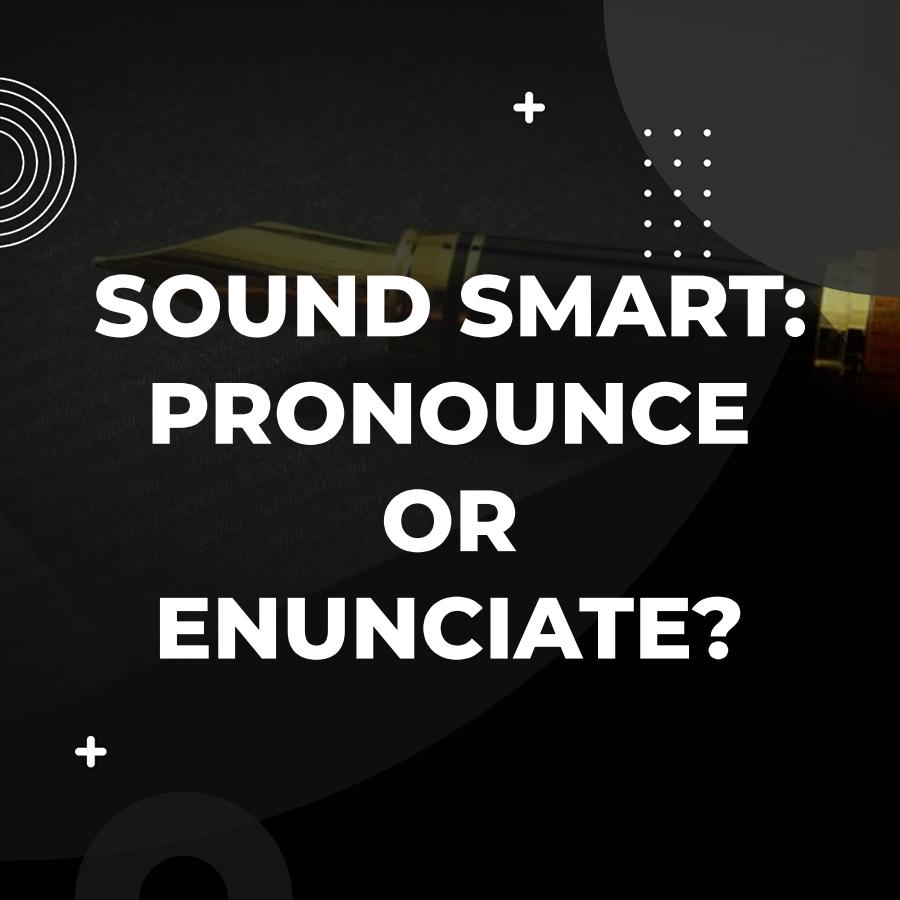In the world of communication, sound matters. The way we say words can affect our understanding and the clarity of our messages. But what’s the difference between pronunciation and enunciation? While the two terms might seem similar, they refer to distinct aspects of speech. Pronunciation focuses on the way words sound when spoken. Meanwhile, enunciation emphasizes clarity and the distinctiveness of each syllable and sound.
Table of Contents
What is Pronunciation?
Pronunciation pertains to how a word is spoken, including the correct sounds and the rhythm of the word. It varies across languages, regions, and even among individuals. Accurate pronunciation helps others understand and link words to their meanings.
For instance, consider the word “schedule.” In American English, it’s pronounced as “sked-jool,” while in British English, it’s often pronounced as “shed-yool.” Both pronunciations are correct, illustrating how pronunciation can differ based on geographical location.
Examples of Pronunciation in Action
Imagine a classroom setting where a teacher introduces a new vocabulary: “entrepreneur.” If a student pronounces it as “entrep-er-noor,” their peers may not understand. This mispronunciation can lead to confusion regarding the subject matter. On the other hand, correctly pronouncing it as “ahn-truh-pruh-nur” helps ensure everyone understands the topic discussed.
In digital settings, pronunciation also takes center stage. Voice recognition software, such as Siri or Google Assistant, relies heavily on pronunciation accuracy. If a user says “navigate” with a slurred pronunciation, the software might misunderstand the request. Such mistakes illustrate how pronunciation directly impacts communication efficiency, especially in our tech-driven environment.
What is Enunciation?
Enunciation is the clear and precise pronunciation of words. It means articulating each sound distinctly so that listeners can easily understand the spoken words. Strong enunciation not only makes speech more comprehensible but also adds professionalism to oral presentations or public speaking.
Consider a public speaking scenario. A speaker who rushes through their talk may leave the audience puzzled. If they say, “I’m excited to announce the winning team,” with poor enunciation, people might mishear it as “I’m excited to announce the whining team,” leading to chuckles instead of applause.
Enunciation Everywhere
Enunciation is crucial in various contexts, like debates, interviews, and performances. Think of Broadway performers or news anchors—they masterfully articulate words to ensure viewers grasp every nuance of what’s happening. A newscaster might say, “There has been a major development in the case,” with careful enunciation, making it clear and impactful.
Even in casual conversations, enunciating words correctly can make a world of difference. Imagine discussing a complex topic such as climate change over coffee with a friend. If you mumble or slur your words, your friend might completely misunderstand your point, leading to miscommunication.
The Interplay Between Pronunciation and Enunciation
While pronunciation and enunciation serve different purposes, they often work together to achieve effective communication. Poor pronunciation breaks clarity, and mumbled articulation muddies meaning as well. Speaking skillfully demands attention to both, which reduces confusion in conversations.
Real-World Examples of Pronunciation and Enunciation Together
During a teleconference, a team member announces, “We’re facing a critical deadline.” If they pronounce “critical” as “criti-cal” and mumble the phrase, the message may fail to resonate. Listeners could misinterpret the seriousness of the situation. Effective communication requires both precise pronunciation and clear enunciation.
In contrast, a motivational speaker who articulates words clearly while using incorrect pronunciation could lead to confusion. For example, saying “in-de-struct-able” instead of “indestructible” can distract an audience from the overall message, no matter how clear their enunciation may be.
Language Learning and Its Impact on Pronunciation vs. Enunciation
Language learners often grapple with both pronunciation and enunciation as they acquire new languages. When learning English, a Spanish speaker may struggle with the “th” sound in words like “this” or “that.” Consequently, if they pronounce it as “dis” or “dat,” this may lead to miscommunication.
As students practice enunciation in tandem with pronunciation, they can improve their overall communication skills. Practicing tongue twisters, for instance, can enhance enunciation while simultaneously honing pronunciation. For example, the phrase “She sells seashells by the seashore” challenges the mouth to handle each “s” sound perfectly, word after word.
Tips for Improving Pronunciation and Enunciation
Enhancing both skills can significantly improve your communication abilities. Here are practical tips that can aid in developing stronger pronunciation and enunciation:
1. Practice with the Phonetic Alphabet
Utilizing the International Phonetic Alphabet (IPA) can help familiarize you with the sounds of various languages. Each symbol corresponds to a specific sound, allowing you to hone in on difficult pronunciations.
2. Record Yourself
Listening to recordings of your speech can be a beneficial reflective exercise. This approach helps pinpoint areas needing improvement. When you hear your enunciation or mispronunciations, you can analyze and adjust accordingly.
3. Utilize Speech Exercises
Engaging in exercises designed to enhance articulation can be incredibly effective. Exercises like repeating complex phrases or using tongue twisters can foster enunciation clarity.
4. Watch and Imitate
Observing proficient speakers—be it actors, public speakers, or news anchors—can provide vital clues on pronunciation and enunciation techniques. Imitating them can help gain confidence in your speech-making skills.
5. Read Aloud
Reading aloud can significantly aid both pronunciation and enunciation. Choosing complex texts or poetry allows you to focus on how you articulate each word while simultaneously practicing correct pronunciation.
The Importance of Context
The significance of pronunciation and enunciation extends beyond mere correctness. In a business setting, how a professional articulates important presentations or discussions can influence perceptions of credibility. Should a CEO mispronounce key terms during a shareholders’ meeting, it might not only come off as careless but also impact their authority.
Conversely, a well-enunciated speech delivered by an executive can promote transparency and clarity. This direct explanation is especially crucial when navigating intricate. For example, when discussing yearly sales forecasts, communicating the numbers accurately can prevent costly misunderstandings.
In Educational Environments
Teachers play a vital role in shaping their students’ understanding of pronunciation and enunciation. When educators model clear pronunciation and emphasize proper enunciation, students are more likely to adopt these habits. Moreover, fostering a classroom environment where students practice respectful listening and speaking can further enhance everyone’s communicative effectiveness.
Cultural Nuances in Pronunciation and Enunciation
Understanding pronunciation and enunciation requires cultural awareness, as different cultures may have unique expectations about communication. For example, speakers of tonal languages such as Mandarin Chinese have sound variations that directly impact meaning. Mispronouncing a tone can change a question into a statement, leading to significant misunderstandings.
In regions with diverse linguistic backgrounds, enunciation often adjusts to accommodate various accents. For instance, a multicultural workplace may present challenges, as individuals from different linguistic backgrounds may need to adapt their pronunciation for effective teamwork.
Resources for Practice
Utilizing various resources can help develop strong pronunciation and enunciation skills.
Online Courses
Websites such as Coursera or Udemy offer courses specifically designed to help improve public speaking and articulation. These programs often include exercises that target pronunciation and enunciation, such as practicing with different accents or using specific enunciation drills.
Mobile Apps
Apps like ‘Speech Ace’ or ‘Elsa Speak’ provide immediate feedback on pronunciation and can be excellent tools for self-improvement. These apps often contain interactive exercises and quizzes to fine-tune your skills.
Speech Coaches
Hiring a speech coach or tutor can also provide personalized feedback tailored to your needs. Whether you’re preparing for a presentation or enhancing daily communication, one-on-one coaching allows you to focus on your individual pronunciation and enunciation challenges.
Additional Information
Understanding the differences between pronunciation and enunciation can elevate your spoken word game.
- Pronunciation refers to The Way we say a Word: It’s all about the sounds we make; think of it as the accent and stress on syllables. Pronunciation varies from one dialect to another, creating confusion or new meanings.
- Enunciation Is About Clarity: Speak each syllable clearly and sharply. Articulate each part so listeners connect with your message without confusion.
- Dialect vs. Enunciation: Different regions may have unique pronunciations, but enunciation remains a universal concept. You can mispronounce a word with flair, but if you enunciate properly, you can still get your point across.
- Impact on Comprehension: People may mispronounce a word, but if they enunciate well, listeners can often grasp the intended message. On the flip side, crystal-clear enunciation can compensate for a slight pronunciation error.
- Role in Public Speaking: Good speakers often prioritize enunciation over perfect pronunciation because clarity fosters better audience engagement. The audience may forgive minor mispronunciation, but will tune out if they can’t understand a word.
- Practice with Tongue Twisters: A powerful way to improve both pronunciation and enunciation is to tackle tongue twisters. These quirky phrases challenge your mouth’s dexterity and sharpen your clarity.
- Vocabulary Influence: Clarity in speech does not demand accuracy for all words. However, technical or less typical words benefit greatly from both proper pronunciation and enunciation to avoid confusion.
- Cultural Awareness: Different cultures may have distinct pronunciations for the same word. Therefore, enunciation helps in cross-cultural communication.
- The Role of Accent: A strong accent can influence pronunciation, making it difficult to be understood. Enunciation is crucial in helping to bridge that gap, providing a more precise path for communication.
- It Goes Beyond Speech: In writing, enunciation translates to how clearly you express your ideas. A well-enunciated point is like a well-pronounced word—both demand attention and respect.
Frequently Asked Questions (FAQs) Related to Pronunciation vs Enunciation
Q. What is the difference between pronunciation and enunciation?
A. Pronunciation explains how people say words by paying attention to the sounds each letter makes. Enunciation, on the other hand, is about how those words are delivered, ensuring each word is distinct and understandable.
Q. Why is pronunciation important?
A. Pronunciation is essential because it affects how well others understand you. Mispronouncing words can lead to confusion or misunderstandings.
Q. Can you give an example of pronunciation?
A. Sure! The word “tomato” can be pronounced as “tuh-MAH-toh” or “tuh-MAY-toh,” depending on the speaker’s regional accent.
Q. What about enunciation? Why does it matter?
A. In language, enunciation matters because it ensures that listeners catch every sound. Good enunciation makes communication smoother and prevents misinterpretation.
Q. How can I improve my pronunciation?
A. You can improve pronunciation by listening to native speakers, practicing with audio resources, and repeating words until you get comfortable saying them correctly.
Q. What can I do to enhance my enunciation?
A. To enhance enunciation, practice speaking slowly and deliberately, exercise your mouth and jaw, and read aloud while focusing on clarity.
Q. Is it possible to have good pronunciation but poor enunciation?
A. Yes, it’s possible. You can pronounce words correctly but still mumble or speak too quickly, making it hard for others to understand you.
Q. Can accents affect pronunciation?
A. Yes, accents can significantly affect pronunciation. Different regions or countries may have distinct ways of saying the same word.
Q. How can I tell if my enunciation is off?
A. You can tell if your enunciation is off if people frequently ask you to repeat yourself or if they seem confused by what you’re saying.
Q. Are pronunciation and enunciation equally important?
A. Both are important! Good pronunciation ensures correct sound, while strong enunciation ensures your words are heard and understood by others.
Conclusion
Understanding the difference between pronunciation and enunciation is crucial for effective communication. Pronunciation focuses on how we say words, while enunciation emphasizes clarity and precision in our speech. Improving both can enhance your speaking skills, whether you’re giving a presentation or chatting with friends. By practicing these techniques, you’ll not only sound more professional but also be better understood, making your conversations more enjoyable for everyone involved. Keep these tips in mind, and you’ll be well on your way to mastering the art of clear communication.







